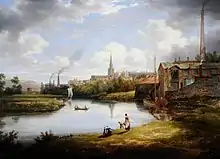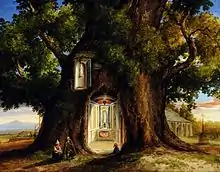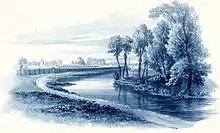William Cowen
William Cowen (18 June 1791 – 29 January 1864) was an English landscape painter. His work includes views of towns in Yorkshire, Italy, France, Ireland and particularly Corsica.
William Cowen | |
|---|---|
| Born | 18 June 1791 Rotherham, England |
| Died | 29 January 1864 (aged 72) Brompton, London, England |
| Known for | Water colours and landscape painting |
Life
Cowen was born in Rotherham in 1791 and worked teaching drawing in nearby Sheffield in 1811. Cowen was lucky enough to obtain William Fitzwilliam, 4th Earl Fitzwilliam as a patron, who paid for him to visit Italy via France and Switzerland in 1819 and 1822. In 1824 he published Six Views of Italian and Swiss Scenery, which included his own engravings from his continental tours.[1]

In 1826 Ebenezer Rhodes published Yorkshire Scenery, which included Cowen's View of Rotherham as well as two of his drawings of the ruined Roche Abbey.[2] This was intended to be the first volume of a set, but Rhodes failed to make a profit or publish more.[3]
Cowen was one of the eight people who founded the Royal Institute of Painters in Water Colours. The institute was launched with an opening exhibition in 1832 that attracted 300 paintings from 120 artists and, remarkably, made a profit. The organisation is still going but Cowen had left the organising committee by the following year.[4] By this time Cowen had moved to London where he was based when not travelling on sketching trips.

Cowen travelled to Corsica on 12 August 1840, which was seen as novel, and when he returned he completed a number of paintings, several being associated with the early life of the Corsican Napoleon Bonaparte. In 1848 Cowen gathered his Corsican pictures together to create a travelogue entitled Six Weeks in Corsica, illustrated with fourteen engravings. He noted in the book how few visitors the island received and how much Corsica deserved investigation. This book was dedicated to his patron Earl Fitzwilliam.[5] In the same year Cowen also contributed landscapes to the Free Exhibition of Modern Art at Hyde Park Corner. This exhibition was more democratic than those put on by other institutions, attracting those unhappy with bodies such as the Royal Academy.[6]
An 1846 painting of Rotherham parish church indicates that he may have returned to his birthplace but he is known to have recreated paintings from sketches made years before. Cowen died in Brompton in 1864. His residence was Gibraltar Cottage in Thistle Grove.[2]
Legacy

Cowen has over a dozen paintings in public collections in the United Kingdom. Several are views of Sheffield and Rotherham and these are in the respective municipal collections. He has eleven water colours in the British Museum and he also painted several views of Italy,[7] France, Ireland[8] and particularly Corsica. 31 sketchs around the Royal Borough of Kensington and Chelsea are owned by the local library and the drawings record lost sights like the Kensington Canal[9] and others like the Brompton Cemetery[10] where Cowen is buried.[2]
References
- Cowen, W (1824). Six Views of Italian and Swiss Scenery.
- Delia Gaze, 'Cowen, William (1791–1864)', Oxford Dictionary of National Biography, Oxford University Press, 2004. Accessed 19 October 2013
- Charlotte Fell-Smith, 'Rhodes, Ebenezer (1762–1839)', rev. Elizabeth Baigent, Oxford Dictionary of National Biography, Oxford University Press, 2004. Accessed 19 October 2013
- Holme, Charles (1906). The Royal institute of painters in water colours.
- Cowen, William (1848). Six Weeks in Corsica: Illustrated with Fourteen Etchings. TC Newby.
- Chambers's Edinburgh Journal, No. 444 Volume 18, New Series, 3 July 1852.
- 13 paintings by or after William Cowen at the Art UK site
- Benezit dictionary of British graphic artists and illustrators. Oxford: Oxford University Press. 2006. p. 285. ISBN 0199923051.
- The Kensington Canal, railways and related developments, Survey of London: volume 42: Kensington Square to Earl's Court (1986), pp. 322–338. Accessed 19 October 2013.
- Idle days in southern Kensington: William Cowen country, Dave Walker, South Kensington Library, 2010. Accessed October 2013
External links
| Wikimedia Commons has media related to William Cowen. |